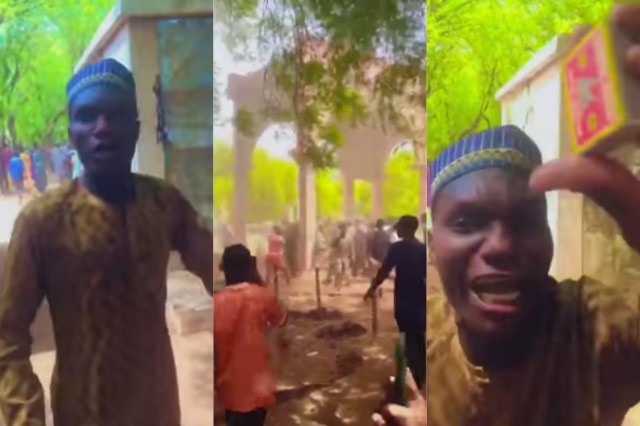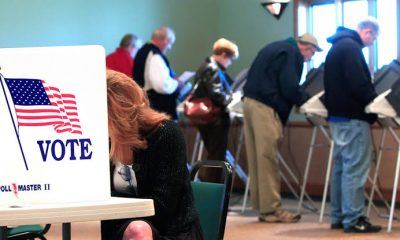Opinion
The Truth About Religious Intolerance In Nigeria

By Raymond Oise-Oghaede
The recent incident in Sokoto which has attracted serious backlash and disaffection from within and outside the country is extremely unfortunate. The spillover effects which has been generating ever since need proper and careful handling by all and sundry in order not escalate into unpleasant situations with irreparable consequences. There is no other word that could better be ascribed to the heinous act than “intolerance”; and, the misconceptions and misinterpretations that a lot of people have been disseminating around are not helping matters. It is in view of the foregoing that this review is necessitated as a way to pacifying the already tensed atmosphere and proffering suggestions to preventing re occurrence of such in our societies. Therefore, the aim of this write up will not be to apportion blames in order not to aggravate the situation and prejudice the case in court; but, it will not also be silent or fail to state it in categorical terms that the lynching of the victim for whatever reason is barbaric, callous and unlawful; and, such should not be condoned in any sane society, to say the least.
Our country is operating a democratic system of government with the “rule of law” as one of its cardinal principles; therefore, it is expected that the citizenry shall be guided by the law. There is no place in any subsisting law of this country where it is provided that anyone has the right or authority to take laws into his hands. More so, Section 33 (1) of the 1999 Constitution of the Federal Republic of Nigeria (as amended) states it clearly that “every person has the right to life, and no one shall be deprive intentionally of his life, save in execution of the sentence of a court in respect of a criminal offence of which he has been found guilty in Nigeria”. Be that as it may, what happened in this circumstance could be said to be an aberration from the law of the land. This is totally unacceptable; and, such should be “firmly condemned” in all its ramifications. The authorities must rise up to the occasion towards ensuring that the needful is done to serve as deterrence to others. However, it need be quickly mentioned that those that have been arrested and charged for the death of the victim are to be presumed innocent until proven guilty by a court of competent jurisdiction as provided in Section 36 (5) of the same Constitution under reference. In this situation, the burden of proof shall be on the prosecution; and, they are expected to prove their case beyond reasonable doubt.
Now that the incident has happened and there is nothing we can do to bring back the dead to life; our best option would be to wait for the outcome of the court proceedings hoping that justice would be served at the end of the day. At this stage, it is very important to delve extensively into the issue of “religious intolerance” being the major revolving factor of this incident. “Religion”, according to the Oxford Languages Dictionary, is simply defined as “the belief in and worship of a superhuman controlling power, especially a personal God or gods”. It could also be put differently, as a particular system of faith and worship. In the Nigerian settings, the three major system of faith and worship are Christianity, Islam and the African tradition or others. Majority of the people “do not joke” with their religion; and, as such, it will be safe to say that Nigerians, to a large extent, are “very religious” Therefore, it is not surprising that Section 38 (1) of the Nigerian Constitution guarantees freedom of religion. However, such freedom is to the extent of allowing every citizen to choose, decide, manifest and propagate his religion or belief in worship, teaching, practice and observance. As a result of this provision, no one can compel you to practice any religion against your wish; and, no one can deprive you from practicing the belief or religion of your choice.
The above provision notwithstanding, it is very important to quickly mention that, the freedom does not “permits” anyone to “abuse” or “disparage” other people’s religious beliefs or inclination; because, in the face of the law, no one religion is taken as being superior to the other(s); and, that is why the country is termed as a SECULAR STATE. It is in recognition of this basic fact that the people are expected to co-exist peacefully and harmoniously in every nook and cranny of the country regardless of whichever religion they practice. Consequently, there is expectations of high level of tolerance amongst the people in order to make the coexistence to remain meaningful, cordial and mutually beneficial. It is only in circumstances where this high level of TOLERANCE breaks down and slide into a state of INTOLERANCE that such ugly incidents like what happened in Sokoto rear their ugly heads.
From the foregoing, it is obvious that the minimum requirement for living together happily and coordinately, is TOLERANCE. If we tolerate one another, then there will be MUTUAL RESPECT for our different styles and modes of worshiping God (whilst also noting to accommodating and respecting the positions of those that does not even subscribe to the existence of God). The most important thing here is that every man has got the right to his beliefs and unbelief. As such, you are free to propagate your beliefs to high heavens (provided that in doing so, the rights and sensibilities of others are not encroached); and, in the same vein, you can also hold onto your unbelief (provided such is also done without trampling on the beliefs and sensibilities of others). You are free to solicit and encourage other people to embrace your religion; but, in doing so, there shouldn’t be any form of compulsion or intimidation in your mode of trying to convert them, Furthermore, as a traditionalist, a Christian or a Muslim today, you can freely convert to any religion tomorrow; because, the choice is yours.
Looking at it holistically, Nigerians could be said to be highly tolerable in terms of religious differences. There is hardly any community that you go across the length and breadth of the country that you would not find people of different beliefs living and doing businesses together. As you see different denomination of churches on almost every streets; so also you see mosques of different sizes along the same stretches. As, you hear melodious songs and praises coming from loud speakers of churches; so also you hear the Muslims calling for prayers five (or in some cases six) times daily in the same manner without anyone complaining against one another. The Traditionalists and others are not left out as they also go about their worships and businesses without condemnations from the Muslims or the Christians. So, to a very large extent, it is safe to say that religious tolerance is prevalent in the country.
In the dim and distant past, some missionaries and religious bodies such as the Methodists, the CMS, the Roman Catholics, the Anglicans, the Ansar-Ud-Deen, the Ahmadiyyahs, the Zumratul Islamiyyahs, the Nawair-Ud-Deen and others, through their educational institutions played a pivotal role in instilling religious tolerance amongst their pupils/students and the generality of their members. Some other societies and organizations such as the Eckankar, the Rosicrucian Order, the Freemansory, the ROF to mention but a few, also contributed their quota to sustaining high level of tolerance amongst the different religion and beliefs. My experience during secondary school days at Ansar-Ud-Deen Grammar School, Randle Avenue, Suru-Lere, Lagos (a Muslim school) in the late 70s and early 80s is still fresh in my memory. The school could be likened to a training ground where religious and ethnic tolerance were not relegated in the cause of our academic pursuit. Despite the fact that the student population was made up of people of different religion and ethnic backgrounds; we co-existed peacefully, harmoniously and happily like children from the same parents (though, we were not also totally immuned from the natural traits of youthful exuberance). Day in day out, we were never tired or bored of praying according to the Islamic doctrine during the morning devotions. Though, the Christians also have dedicated days for “Fellowships”; there was never a time where we experienced religious friction throughout my stay in that school. The atmosphere was always devoid of any form of discriminations; and, it was only during Jummah prayers on Fridays and the dedicated days for our Bible fellowships that you are able to distinguish the Muslims from the Christians amongst us. It is therefore, not surprising to me that the solid foundation of religious tolerance that was laid for us since then has been very crucial in my unblemished and unbiased relationship with people of other faiths and beliefs till date.
The situation was not different during my sojourn in Jos, Plateau state where the Muslims and the Christians lived together happily and peacefully in the hostels and the surrounding environments. I was always thrilled and extremely proud of the state and her people whenever I walked through Adebayo Street in the Terminus area of the city to behold a church and a mosque sharing the same fence. These two places of worships (as I was rightly informed) had co-existed for several decades without any form of conflicts or disagreements. The excellent care and wonderful treatments that the then Deputy Governor of the state, Alhaji Halilu Bala Usman (a core Muslim) and other staff of the office accorded us (my humble self and two other Christian Corps Members) throughout our service (NYSC) year will remain indelible in my heart.
So, it becomes unbearably worrisome and saddening whenever incidents like this happen, and some people are always quick to jump into conclusion that a particular set of people and their religion are scheming to eradicate of wage war against believers of other faiths or religions. We have come a long way together and it will be a big shame if mutual suspicion is the order of the day amongst us at this time and age. In a country with over 200 million people, it is natural to be experiencing conflicts of interests once in a while; but, that does not mean that we should now forget the positive aspects of our togetherness and set the country on fire for the acts committed by a few. If you take a closer look at the situation, you will observe that the tendencies to committing such heinous act(s) in the guise of protecting one`s religious beliefs and inclinations are mostly dependent on the environment and the level of tolerance of the people involved. In an environment where the attributes of “fanaticism” and “extremism” are prevalence, the tendencies for such incident to occur will be very high than in other areas where those attributes are very low or non-existent. Interestingly, such people are not restricted to a particular religion or ethnic group; but, they cut across all stratifications.. Thus, there are instances where some Christians and Muslims see and treat their fellow Christians and Muslims as “sinners” and “infidels” respectively. So, the issue of intolerance is not always a case of Muslims against Christians and others, or Christians against Muslims and others; but, instances abounds where they are Muslims against fellow Muslims and, Christians against fellow Christians.
From whichever angle or perspective we tend to look at it, one of the major factor that has contributed to religious intolerance or acts of fanaticism and extremism in our societies is derived from the “unguarded” and “twisted” “gospels”, “hadiths” and “messages” from the pulpits, alters and shrines of many of our today’s pastors, imams and other religious leaders. Some inciting messages are recorded in audio and video cds; others are written in books and pamphlets or tracts which are used to indoctrinate people into seeing one belief or the other as more authentic or superior to the others. As such, these people who could do “anything” to protect and propagate their own religion are made to see other beliefs or modes or worship as forbidden.
Another major factor that could be responsible for the occurrence of such unfortunate incidents is the misinterpretation of the provision of Section 39 of the Nigerian Constitution which states that “every person shall be entitled to freedom of expression, including freedom to hold opinions and to receive and impart ideas and information without interference”; to mean that everyone have the right to say whatever they like under the sky without repercussions. So, in the cause of exercising their freedom of expression, such people make remarks that sometimes disparage or demean other people`s beliefs and religions. The people in this category are quick to forget that Section 45 of the same Constitution also made it clear that “nothing in Sections 37, 38, 39, 40 and 41 of the Constitution shall invalidates any law that is reasonably justifiable in a democratic society –
a. in the interest of defence, public safety, public order, public morality or public health; or
b. for the purpose of protecting the rights and freedom of other persons.
What the above means is that the freedom of expression is to the extent that it does not cause a threat or infringement to other people`s rights. It means that, no one is permitted to express himself in a manner that will constitute an abuse to the rights (including religious right) of others. So, we should always be mindful of our utterances on issues pertaining to religion because we never can say when such will provoke those that does not have the spirit of tolerance (across all the religious beliefs) to taking irrational action(s).
From the foregoing, there is no gainsaying the fact that religious intolerance is a plague that we should all join hands together to eradicate from our societies to forestalling such heinous incident that happened in Sokoto. This is very important because, even if justice is eventually served against the perpetrators for taking laws into their hands; the life or lives that have been lost will be irreparable.
It will also be in the interest of peaceful co-existence if we should all start restraining ourselves from doing anything that could be seen or taken as denigrating other people`s religion; and, which are capable of degenerating into unfortunate situations.
The governments at all level should put machineries in place towards ensuring that all identified factors that could lead to religious intolerance are tackled comprehensively. Any such message(s) of incitements or abuse by anyone against any religion should be viewed seriously and be met with appropriate punishments; and, anyone or group of people that take laws into their hands as a result of intolerance should also be made to face the full wrath of the law.
Our men of God (Pastors, Imams and others) should make it a point of duty to always use available opportunities to preach religious tolerance to their congregations/followers; so that the few amongst us that are still capable of overreacting to abuses will gradually imbibe the spirit of not taking laws into their hands.
Those of us that are “soldiers” and “defenders” of our respective religion should know that the laws of the country does not permit anyone to deprive another of his life. We should not hide under any claim that the PURNISHMENT for BLASPHEMING or any such religious abuse is DEATH. There is no such provision in the Constitution or any known statutory law of our country. If anyone kills under the guise of fulfilling the penalty prescribed by the doctrines of any religion whatsoever; that person would be running foul of the provision of Section 33 (1) of the Constitution as earlier stated above; and, such person would be made to face the consequences.
All major religious organizations and associations should also ensure that they regularly interface with one another regardless of their religious affiliations to work out ways of eradicating “religious intolerance” and promoting peaceful and harmonious co-existence amongst their followers. A situation, where they wait for unfortunate incidents like this to happen before trading blames and expressing disaffections will not help matters.
For those of us who are also feeling CHEATED for always tolerating and remaining calm in the face of such abuses against our religion; I want to assure you that being civil and decorous in the handling of religious matters is not in any way an act of cowardice, foolishness or weakness; it is what is expected to be done under every sane society. Engaging in retaliatory actions or becoming intolerant to one another will never be the solutions to the wrongdoings. As the popular saying goes, “two wrongs don`t make a right”.
In conclusion, my advice to all and sundry is that, in any circumstances or side of the divide we find ourselves; we should always try as much as possible to ensure that we do not do anything to abuse or demean other people`s religious beliefs; and, if peradventure we feel that ours has been abused; the best thing to do is to report to the appropriate authorities and allow the law to take its course.
We must all come together, join hands together and, fight “Religious Intolerance” together; because, we are all in it together.
Thanks.
Oise-Oghaede is a Political & Public Policy Analyst. He writes from Suirulere, Lagos and can be reached on raymondoise@yahoo.com.









